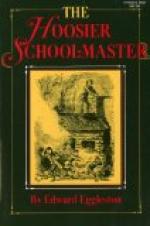Walter then told of the robbery at Schroeder’s, told where he and Small had whittled the fence while the Joneses entered the house, and confirmed Ralph’s story by telling how they had seen Ralph in a fence-corner, and how they had met the basket-maker on the hill.
“To be sure,” said the old man, who had not ventured to hold up his head, after he was arrested, until Walter began his testimony.
Walter felt inclined to stop, but he could not do it, for there stood Mr. Soden, looking to him like a messenger from the skies, or the bottomless pit, sent to extort the last word from his guilty soul He felt that he was making a clean breast of it—at the risk of perdition, with the penitentiary thrown in, if he faltered. And so he told the whole thing as though it had been the day of doom, and by the time he was through, Small’s trunk was in court.
Here a new hubbub took place at the door. It was none other than the crazy pauper, Tom Bifield, who personated General Andrew Jackson in the poor-house. He had caught some inkling of the trial, and had escaped in Bill Jones’s absence. His red plume was flying, and in his tattered and filthy garb he was indeed a picturesque figure.
“Squar,” said he, elbowing his way through the crowd, “I kin tell you sornethin’. I’m Gineral Andrew Jackson. Lost my head at Bueny Visty. This head growed on. It a’n’t good fer much. One side’s tater. But t’other’s sound as a nut. Now, I kind give you information.”
Bronson, with the quick perceptions of a politician, had begun to see which way future winds would probably blow. “If the court please,” he said, “this man is not wholly sane, but we might get valuable information out of him. I suggest that his testimony be taken for what it is worth.”
“No, you don’t swar me,” broke in the lunatic. “Not if I knows myself. You see, when a feller’s got one side of his head tater, he’s mighty onsartain like. You don’t swar me, fer I can’t tell what minute the tater side’ll begin to talk. I’m talkin’ out of the lef’ side now, and I’m all right. But you don’t swar me. But ef you’ll send some of your constables out to the barn at the pore-house and look under the hay-mow in the north-east corner, you’ll find some things maybe as has been a-missin’ fer some time. And that a’n’t out of the tater side, nuther.”
Meantime Bud did not rest. Hearing the nature of the testimony given by Hank Banta before he entered, he attacked Hank and vowed he’d send him to prison if he didn’t make a clean breast. Hank was a thorough coward, and, now that his friends were prisoners, was ready enough to tell the truth if he could be protected from prosecution. Seeing the disposition of the prosecuting attorney, Bud got from him a promise that he would do what he could to protect Hank. That worthy then took the stand, confessed his lie, and even told the inducement which Mr. Pete Jones had offered him to perjure himself.




